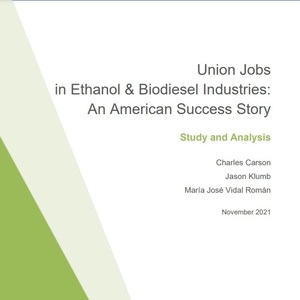Report: Ethanol and biodiesel sectors support union jobs

November 10, 2021
BY Renewable Fuels Association
A new report out today demonstrates that America’s biofuel industry is a major creator of union jobs for the middle class. Authored by veterans of the Bureau of Labor Statistics, the U.S. General Services Administration, and KPMG International, the report, “Union Jobs in Ethanol & Biodiesel Industries: An American Success Story,” tracks above-average union strength across the ethanol and biodiesel supply chains.
“This important report illustrates how America’s biofuel industry is growing union jobs and helping to rebuild the middle class,” noted sponsors of the study in a joint statement from the Renewable Fuels Association, Advanced Biofuels Business Council, Growth Energy, and the National Biodiesel Board. “It also underscores the truth behind President Biden’s declaration that ‘doubling down on these liquid fuels of the future will not only make value-added agriculture a key part of the solution to climate change — reducing emissions in planes, ships, and other forms of transportation — but will also create quality jobs across rural America.’ As global climate conversations continue, we urge policymakers to embrace America’s biofuel industry as a vital tool to rebuild the economy around homegrown and clean energy solutions.”
The research demonstrates that the U.S. biofuel industry supports more than 30,000 union jobs, primarily in agriculture, manufacturing, transportation and utilities, construction, and professional and business services. These include jobs filled by members of the United Automobile, Aerospace and Agricultural Implement Workers of America (UAW), United Steelworkers of America, Laborers’ International Union of North America, International Union of Operating Engineers, North America’s Building Trades Unions, the Bakery, Confectionery, Tobacco Workers and Grain Millers International Union, the Brotherhood of Locomotive Engineers, and many other labor organizations across 20 states.
Advertisement
Advertisement
“The U.S. biofuel industry supports union jobs in construction and manufacturing, but as importantly relies on sectors with high union densities to store and transport its products,” wrote the authors. “A key takeaway is that continued support for the ethanol and biodiesel industries will have a positive causal effect on union jobs and is a pathway to an increase in union membership. Ethanol and biodiesel industries are also helping to mitigate against a downward trend in U.S. union density rates. The result of ongoing support for ethanol and biodiesel is likely to be an increase in middle-wage and middle-skill union jobs in traditionally agricultural economies.”
The authors also note that their findings are consistent with those of the Energy Futures Initiative, which found a union density rate of seven percent in the ethanol and biodiesel industries in 2019, above the national private sector average of six percent.
“Unionized workers also play a sizable role in the transportation of ethanol and biodiesel,” added the authors. “Thirteen unions, some affiliated with larger international unions, represent more than 140,000 employees working for America’s freight rail companies. The freight rail industry is one of the country’s most heavily unionized industry sub-sectors. Looking at ethanol alone, it cannot be shipped through pipelines because of its alcohol content, so other transportation modes must be used. Rail union members help to ship roughly 70% of all ethanol in the United States.”
Advertisement
Advertisement
The high rate of union jobs in the biofuel supply chain is particularly striking given heavy employment in agriculture, the authors explain. That is because agriculture is excluded from coverage by the National Labor Relations Act (NLRA) and because self-employment is significantly more common on farms.
“In sum, what’s good for ethanol and biodiesel is good for unions; and what’s good for unions is good for America,” concludes the report.
Related Stories
At the University of Missouri, plant biochemist Jay Thelen is using arabidopsis as a powerful model to explore ways to boost oil production — an important step toward creating more sustainable, plant-based energy sources.
Iowa farmers have a new market opportunity for their 2025 soybean crop. Landus is expanding its Clean Fuel Regulation initiative, made possible by recent policy changes expected to increase Canada's demand for liquid biofuel.
Topsoe, a leading global provider of advanced technology and solutions for the energy transition, has been selected as the renewable diesel technology partner for CountryMark’s Mount Vernon, Indiana refinery.
The U.S. exported 35,953.6 metric tons biodiesel and biodiesel blends of B30 or greater, according to data released by the USDA Foreign Agricultural Service on Aug. 5. Biodiesel imports were at 2,148.9 metric tons for the month.
XCF Global leverages Alfa Laval technology to enhance pretreatment capabilities at New Rise Reno facility
XCF Global Inc. on Aug. 5announced it leverages Alfa Laval Inc. pretreatment technology at its New Rise Reno biorefinery, a sustainable aviation fuel (SAF) plant located in Nevada. The pretreatment technology enhances feedstock flexibility at the plant.
Upcoming Events










